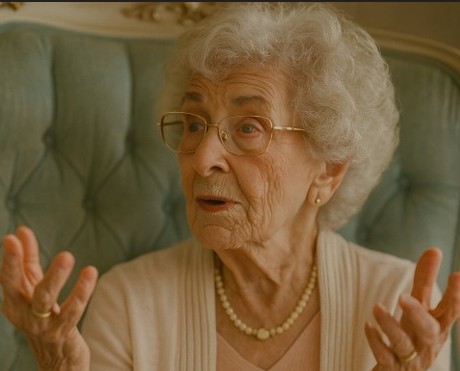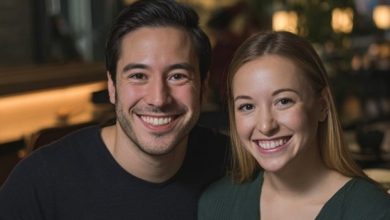No Relatives Visited an Old Woman in a Nursing Facility until They Found Out She’d Inherited $2.3 Million — Story of the Day

Ethel Martin pressed her frail hands against the windowsill and watched a honey-colored butterfly drift over the raised flowerbeds in the small courtyard of Golden Meadows Retirement Home. Outside, roses nodded in the afternoon light, but inside Ethel’s chest there was a familiar tug of loneliness. Another birthday had slipped by without a single phone call from her only child, Carol, or from Carol’s husband, Barry. Six birthdays in a row, six silent summers, and still Ethel’s heart leaned forward in hope, as if expecting the ring of the telephone or the squeak of the front gate.
It had not always been this way. Years earlier Ethel’s clapboard house rattled with laughter—Carol’s friends shouting on the porch, Barry hammering nails into a half-finished deck, Ethel serving peach cobbler to anyone who appeared at the back door. But everything changed when Ethel turned eighty and her knees began to give out. Tasks that once took minutes—buttoning a blouse, tying shoes, boiling water—became long battles. Carol fretted at first, driving across town with soup and fresh bedding, but the visits grew shorter. One chilly November morning, Carol said the house was “too much responsibility” and a nursing facility would be safer.
Ethel did not protest. She trusted her daughter, signed the paperwork, and clung to Carol’s shiny promise: “Mom, we’ll come every Sunday. We’ll bring the grandkids. You’ll barely notice we’re gone.” That Sunday never arrived. Carol and Barry moved into Ethel’s little house, replaced the curtains, painted the mailbox, and slipped into a life that did not include weekly drives to the edge of town.
Now Ethel sat in a soft teal wheelchair near the window of Room 104, clutching a dog-eared photo album. She flipped pages and touched the glossy pictures of Carol in a high-school cap, Carol in her wedding dress, Carol holding her firstborn. Salty tears slid down Ethel’s cheeks and dotted the plastic sleeves.
Mary Alvarez, a junior nurse with kind eyes and a messy ponytail, noticed the tears when she arrived to check vital signs. Mary had learned pieces of Ethel’s story during staff meetings: abandoned mother, daughter living in the mother’s home, no visitors on the contact list. The situation tugged at Mary’s heart each time she wheeled the lunch cart down the hall.
“Mrs. Martin,” Mary said softly, kneeling beside the chair. “You look as though you’re carrying the weight of the sky. Want to talk?”
Ethel’s voice broke like thin glass. “It’s nothing you can fix, dear. My family forgot me, that’s all.” She wiped her eyes with a handkerchief embroidered with her father’s initials. “Six years. Not even a Christmas card.”
Mary reached for Ethel’s hand. “My mama always said patience grows sweet fruit. Maybe the season just isn’t ripe yet.”
Ethel managed a wobbly grin. “Ripe fruit sounds lovely. And so does hearing about your family. Tell me how the little ones are.”
Mary chatted about her three kids—sticky fingers, homework struggles, Saturday soccer. Ethel listened, laughed at the mishaps, and forgot the lingering hurt for a moment. Eventually Mary glanced at the clock, squeezed Ethel’s palm, and promised to return after rounds.
That night, at a scarred pine table in a two-bedroom rental across town, Mary pushed mashed potatoes around her plate while her husband, Joel, unpacked a toolbox from his shift at the factory. Their children—Lia, nine; Mateo, seven; and baby Sofia—watched cartoons in the next room. Mary told Joel about Ethel’s tears, the empty house, and the six silent birthdays.
Joel sighed. “Honey, our place is tiny. We barely fit as it is.”
“I know,” Mary murmured, “but I keep thinking about my grandmother in Guatemala. I was too far away to hold her hand at the end. I don’t want someone else to feel that alone.”
Joel set down his fork. The memory of his own mother, dying quietly in a public ward while he worked double shifts, pinched his heart. He rubbed his forehead, then nodded once. “We’ll find space. Maybe Lia can share a bed with Mateo for a while.”
The following week Mary tackled piles of paperwork, doctor approvals, and state forms. When every signature was done, she rolled Ethel out of Golden Meadows on a bright Monday morning. Ethel clutched a battered suitcase, her gaze darting between excitement and fear. “Are you sure, child? I don’t wish to burden you.”
“Family isn’t a burden,” Mary said, loading the suitcase into a dented van. “And if my kids can hog the couch, you can certainly claim the recliner.”
Life in the Alvarez home bloomed quickly for Ethel. She taught Lia how to bake molasses cookies, helped Mateo memorize multiplication tables, and rocked baby Sofia during evening storms. On Sundays Ethel sat on the stoop, sun on her shoulders, listening to neighborhood kids zip past on bikes. She felt young and necessary again.
One spring morning a thick envelope slid under the front door. Ethel recognized the fancy blue seal of her late mother’s lawyer, Mr. Klein. Hands trembling, she opened the letter. Inside lay three pages of neat type explaining that Ethel’s half-brother, Eugene (whom she had not seen in fifteen years), was near the end of his life. He had set aside all his savings—$2.3 million—and named Ethel the sole beneficiary. The lawyer needed a current address for disbursement; having traced Ethel’s last file to the nursing home, he had tracked her to Mary’s address next.
Mary found Ethel staring at the letter, eyes wide, lips quivering. “Mrs. Martin? Are you alright?”
Ethel pressed the pages to her chest. “Oh, my dear, this changes everything.” She explained about Eugene’s promise to keep her safe, how life had separated them, and how he was fulfilling that promise now. Tears of joy and sorrow mingled.
Mary hugged her tight. “Looks like your fruit just ripened, Mrs. Martin.”
Word of the surprise fortune traveled with the speed of gossip on a windy day. A week later Carol and Barry learned from a neighbor that Ethel was suddenly a millionaire. Panic hit Carol first—visions of fancy vacations and remodeled kitchens flashed through her mind, now threatened by the thought of lawyers or government papers slipping from her grasp. She demanded Barry drive straight to Golden Meadows, flowers in hand, sorrow plastered on their faces.
But the receptionist at the front desk pushed her glasses up her nose and announced, “Mrs. Martin isn’t here. She left months ago.”
Carol’s jaw dropped. “Where did my mother go?”
The receptionist’s expression hardened. “To a place where love lives rent-free. Here’s the forwarding address. Whether you deserve to knock on that door is your choice.”
Barry grabbed the slip, and the couple sped across town. They rehearsed apologies in the car, stuffing resentment beneath syrupy tones. They imagined a grateful mother handing out checks, forgiving the past.
Mary answered the door with baby Sofia on her hip. Carol launched forward, arms open. “Mom! We’ve been so worried!”
From the hallway, Ethel’s calm voice floated forward: “Mary, dear, ask the strangers to state their business.”
Carol froze, eyes wide. Barry’s fingers tightened around the wilting bouquet. Behind Mary, Ethel’s silhouette appeared, shoulders straight, chin lifted. She stopped a safe distance away, scanning the faces she had not seen in six long years.
Carol stepped over the threshold, words tumbling. “Mom, we heard… we heard some news. We want you home. It’s your rightful place.”
Ethel folded her hands. “Home? You mean the house you emptied of my furniture? The one you repainted without asking?”
Barry cleared his throat. “We can fix all that. We can be a family again.”
Mary looked from Ethel to the couple and felt a ripple of tension pass through the small living room. Lia peeked from behind the sofa; Mateo stopped spinning a toy car. Baby Sofia fussed softly.
Ethel drew a breath. Her heart ached and her new life tugged at her in equal force. She knew she was standing at a fork in the road—one path leading back to old wounds, the other to uncertain justice—and her next words would set everything in motion…
How should Ethel respond? Share your thoughts below and see what happens next!



